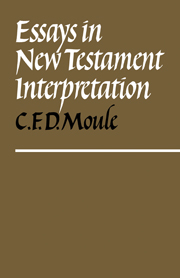Book contents
- Frontmatter
- Contents
- Foreword
- Acknowledgements
- Abbreviations
- Jesus in early Christian interpretation
- Studies in the Gospels
- Two studies in the Epistles
- Two linguistic studies
- Studies exegetical, doctrinal and ethical
- 12 The influence of circumstances on the use of christological terms
- 13 The influence of circumstances on the use of eschatological terms
- 14 St Paul and ‘dualism’: the Pauline conception of resurrection
- 15 A reconsideration of the context of maranatha
- 16 II Cor. iii.18b, καθάπερ ἀπὸ κυρίου πνεύματος
- 17 Punishment and retribution: an attempt to delimit their scope in New Testament thought
- 18 The theology of forgiveness
- 19 Obligation in the ethic of Paul
- 20 ‘…As we forgive…’: a note on the distinction between deserts and capacity in the understanding of forgiveness
- 21 The sacrifice of the People of God
- Index
18 - The theology of forgiveness
Published online by Cambridge University Press: 05 November 2011
- Frontmatter
- Contents
- Foreword
- Acknowledgements
- Abbreviations
- Jesus in early Christian interpretation
- Studies in the Gospels
- Two studies in the Epistles
- Two linguistic studies
- Studies exegetical, doctrinal and ethical
- 12 The influence of circumstances on the use of christological terms
- 13 The influence of circumstances on the use of eschatological terms
- 14 St Paul and ‘dualism’: the Pauline conception of resurrection
- 15 A reconsideration of the context of maranatha
- 16 II Cor. iii.18b, καθάπερ ἀπὸ κυρίου πνεύματος
- 17 Punishment and retribution: an attempt to delimit their scope in New Testament thought
- 18 The theology of forgiveness
- 19 Obligation in the ethic of Paul
- 20 ‘…As we forgive…’: a note on the distinction between deserts and capacity in the understanding of forgiveness
- 21 The sacrifice of the People of God
- Index
Summary
It would be difficult to name an aspect of Christian theology that is wider or more demanding than the theology of forgiveness. To plumb its depths would require not only immense learning and mature thought: it would require also an exceptionally wide pastoral experience. Also, I believe that only he can speak authentically about forgiveness who has himself been greatly forgiven; and, however deeply I may need forgiveness, I do not believe that I have yet begun to understand more than the fringes of the experience. On many counts, then, I am disqualified for anything more than a fragment, at most, of this big task. But I accepted the invitation gratefully because there is a thing that, I hope, I may be able to do – namely, to contribute something towards the definition and clarification of one particular problem in the understanding of forgiveness. It is a problem which happens to be a special concern of mine, and I have more than once before ventured (no doubt rashly) into print about it, and I am not loath to try again to present it. I believe it to be of considerable pastoral and practical importance, though this will not, I fear, be immediately evident. What I am going to say may well sound abstract and academic. But if you will bear with me I hope it will become clear that an understanding of the atonement and of our ministry of reconciliation depends, in some degree at least, upon the clarity with which we grasp the issues in question.
- Type
- Chapter
- Information
- Essays in New Testament Interpretation , pp. 250 - 260Publisher: Cambridge University PressPrint publication year: 1982



